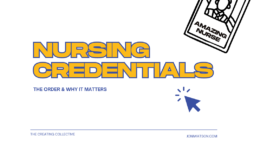The Article: Hill, K. (2011). Work satisfaction, intent to stay, desires of nurses, and financial knowledge among bedside and advanced practice nurses. The Journal of Nursing Administration, 41(5): 211-217.
The Big Idea: Compared to the general population, nurses leave the profession via retirement earlier – seven years earlier, in fact. Work environments and role satisfaction may contribute to nurses’ earlier retirement. Dr. Hill points out that the nursing population is 92% female, and the general literature shows women have less financial knowledge than their male counterparts. With nurses retiring earlier than others in the general population, their economic stability may be impacted more than anticipated. A total of 95 registered nurses, some Clinical Bedside Nurses (CBNs) and some Advanced Practice Nurses (APNs), from a Magnet® hospital answered surveys about their work satisfaction, intent to stay in their current nursing positions, and knowledge about financial issues, particularly retirement-related financial issues.
Survey Says! Both the CBNs and the APNs scored poorly on financial knowledge. This study reconfirmed nurse work satisfaction is directly correlated with the intent to stay in a position. An interesting portion of this study found nurses rated their relationships with their managers better than those with their coworkers.
Quotable: “When nursing staff are satisfied with working conditions such as their overall environment, flexible schedules, and positive relationships, stress tends to be lower, resulting in a decrease in avoidable turnover [references]. The retention of staff supports higher levels of expertise and thus leads to the provision of higher-quality and thus intuitive care [references]” (p. 211).
“As previously stated, nurses as a profession retire or leave the workforce at a younger age than other professions [reference]. Although little research has addressed the question of intent to stay in the nursing profession until the usual retirement age, there is a preponderance of evidence to suggest that nurses prematurely leave the profession because they are unhappy with their work [references]” (p. 212).
So What? Dr. Hill points to nurse leaders to help nurses strengthen relationships among their peers to improve work satisfaction. In addition, Dr. Hill suggests including financial education into professional education to help retain nurses in the profession longer. Retaining nurses not only eases the nursing shortage but it also contributes to institution cost savings and retained nursing knowledge which leads to better patient care and outcomes. Personally, this study’s different survey pieces didn’t seem to fit together. After reading the article, though, the author asks some interesting questions and offers unique solutions to retain nurses within the profession.





